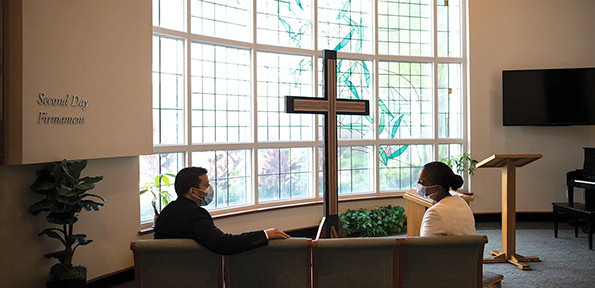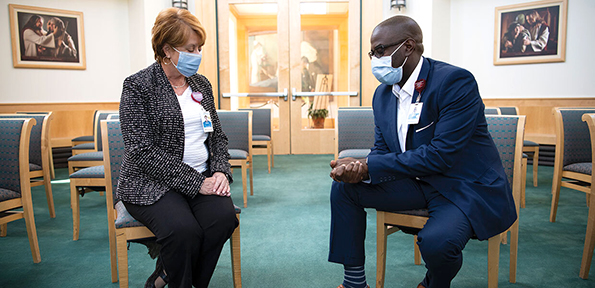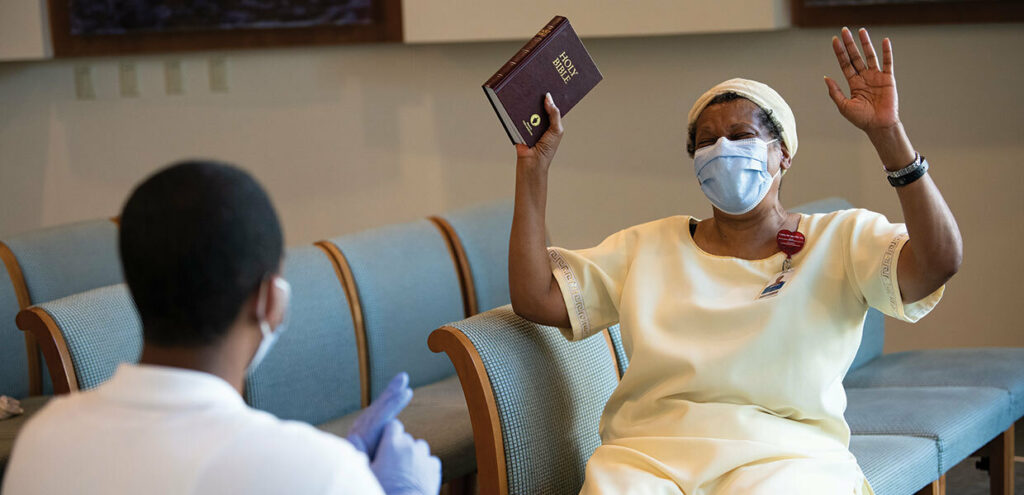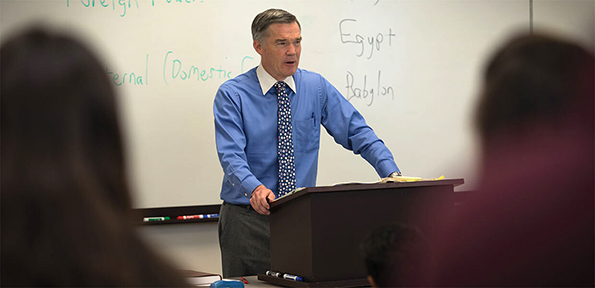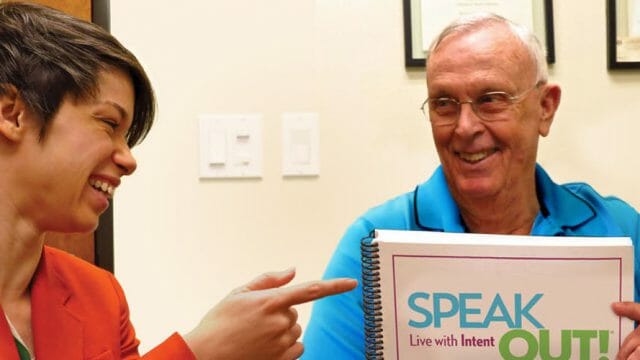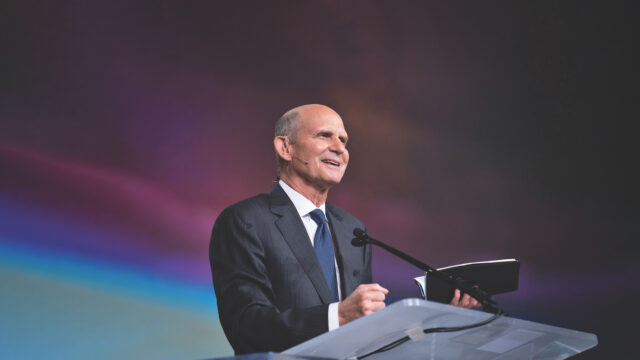Adventist chaplains carry out their ministry to diverse faith groups, following in Jesus’ footsteps.
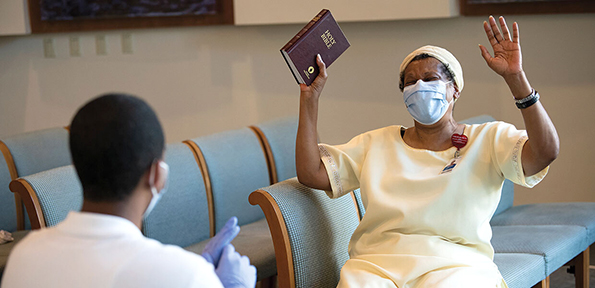
Chaplaincy requires 24/7 ministry to people of diverse faith groups, as well as those with no faith. Few areas of ministry offer greater challenges, excitement, and opportunities.
This specialized ministry covers several areas, including educational campuses, community and government agencies, correctional institutions, health-care facilities, and the armed forces.
Chaplains provide spiritual care and counseling, conduct worship services, perform weddings and funerals, oversee religious education, and advise military leaders, to name a few of their broad responsibilities.
Amid the COVID-19 pandemic, chaplains have been placed on the front lines of ministry as never before. Spiritual care, which is a natural aspect of chaplaincy ministry, has dramatically increased in demand because of the nature of the COVID-19 illness and the losses and death that go with it.
Wanda Davis, a chaplain for AdventHealth in Altamonte Springs, Florida, United States, is among those who have managed to meet many of these challenges in a unique manner. After being quarantined for more than a month on a cruise ship and later an Air Force base during a vacation, Davis shared that her experience helped to prepare her to provide spiritual care to COVID-19 patients, who are not allowed to have visitors.
Recognizing from her own quarantine experience that “people just need to know they’re being cared for and that you are there for them,” she has placed special emphasis on offering this type of care to COVID-19 patients through telephone calls, since physical contact is limited or prohibited.
Juleun Johnson, director of mission and ministry for AdventHealth’s South Market and lead chaplain at AdventHealth Celebration in Florida, shared that the COVID-19 pandemic has required “chaplains to work around the clock, providing spiritual support, nurture, and encouragement to staff, patients, families, and community clergy.” Johnson further described chaplains as “God’s living letters of love, bringing calm and light to a world that is in chaos and in desperate need of hope.”
COVID-19 has additionally required creative and innovative approaches with all aspects of chaplaincy ministry, including funerals. I recently officiated a funeral where only a graveside service was allowed, with social distancing and masks for all attendees except the eulogist. At least for now, this may be the chaplain’s new normal.
To address the need for Adventist chaplains, Southern Adventist University and Oakwood University are committed to preparing students for chaplaincy ministry careers.
Greg King, dean of Southern Adventist University’s School of Religion, recently shared that “the field of chaplaincy presents abundant opportunities for ministering to people who might not ordinarily be reached in a traditional church setting. The School of Religion at Southern offers a major in pastoral care that is designed to help train prospective chaplains to serve in various areas of chaplaincy ministry.”
Leslie Pollard, president of Oakwood University, described Oakwood’s new chaplaincy preparation track, which operates in partnership with AdventHealth and Huntsville Hospital for its clinical pastoral education component, as a “significant advancement in the school’s chaplaincy curriculum.”
In addition to academic training, persons interested in chaplaincy within the North American Division (NAD) have the opportunity to receive support, mentoring, professional development, and chaplaincy endorsement through the NAD’s Adventist Chaplaincy Ministries (ACM) department. According to Paul Anderson, director of Adventist Chaplaincy Ministries at the North American Division, “Adventist Chaplaincy Ministries has been entrusted with the leadership, endorsement, and, in some cases, credentialing of chaplains for 35 years, and continues this work today by serving over 700 endorsed chaplains in the North American Division.”
Ted Hamilton, AdventHealth’s chief mission integration officer, recently shared that “each and every day, AdventHealth’s dedicated chaplains are engaged on the front lines of injury and illness, brokenness and despair, providing comfort, peace, and hope when needed—most through a gentle touch, a healing prayer, or a calming word.”
Religious Pluralism
Because chaplains regularly minister in diverse religious settings, they must develop an appreciation for religious pluralism—the attitude or ability to peacefully coexist with other faith groups without apprehension or dismissing another’s tenets of faith. Jorge Torres, a United States Army chaplain at Fort Bragg, North Carolina, said he is comfortable ministering wherever he is assigned without fear of losing his religious identity.
Torres explained, “Among the many benefits of working in a diverse religious setting is the opportunity to learn firsthand the similarities and differences of other faith groups. When differences are greater than similarities, to the extent that a chaplain cannot directly perform the requested religious support due to a conflict with religious beliefs, a referral is made to another chaplain who can provide the requested support.”
Ministry of Presence
The “ministry of presence” is a phrase used to describe how chaplains minister without words to facilitate spiritual and moral support when entering the room of a dying patient or the cell of a prisoner, or to help a grieving parent, a student with test anxiety, or a service member experiencing post-traumatic stress disorder (PTSD) or moral injury. It is often said that a chaplain’s best sermon is preached without words when patients and family members are facing trauma or death. They appreciate the chaplain’s prayers and quiet presence, which can be more comforting than a thousand spoken words.
Makeba Garrison, a staff chaplain at West Cancer Center, Germantown, Tennessee, said, “The ministry of presence is first and foremost a state of constant prayer. Praying that none of my thoughts, agendas, or assumptions will interfere with being available for the care seeker.”
The ministry of presence is an invaluable strategy for every chaplain and potentially a key component to their success. As chaplain Stephen Davey stated, “We do not have to be brilliant, articulate biblical scholars; the greatest ability as a friend is indeed availability. Just show up—and you exercise the ministry of presence.”
Proselytism
Regardless of the area they serve, chaplains are cautioned to avoid giving the impression of proselytizing—an attempt to convert others to their own faith beliefs. Crossing this line in spiritual care can jeopardize a chaplain’s ministry influence, as well as his or her employment.
It is critical for chaplains to know the difference between evangelism and proselytizing. Barry Black demonstrates this distinction in an exceptional manner in his role as the 62nd chaplain of the United States Senate. His responsibilities include opening each session of the United States Senate with a prayer and providing and coordinating religious programs and spiritual care for senators, Senate staff, and their families. Black carries out his duties despite the United States Senate being a religious melting pot of Protestants, Catholics, Jews, and some senators listed as being unaffiliated with a religious denomination—pluralism at its best.
Another example is in my deployment with the United States Navy as a chaplain to the Horn of Africa. A service member noticed that my diet did not include pork, and after a few weeks he inquired about it. I shared the reason for my dietary practice based on scriptures found in Leviticus 11 and Deuteronomy 14. The service member was thankful for the information I shared, but I shared it only at his request.
Seventh-day Adventist chaplains carry out their specialized ministry wholeheartedly and from a deeply rooted spiritual motivation. The character of Jesus is illuminated in every act of service. Chaplains work long daily hours and on weekends, which sometimes requires absence from some of life’s most important events. They take seriously the words of Jesus spoken on the day of His ascension: “But you shall receive power when the Holy Spirit has come upon you; and you shall be witnesses to Me in Jerusalem, and in all Judea and Samaria, and to the end of the earth” (Acts 1:8, NKJV).*
The original version of this commentary was posted by Southern Tidings.
*Texts credited to NKJV are from the New King James Version. Copyright ã 1979, 1980, 1982 by Thomas Nelson, Inc. Used by permission. All rights reserved.


